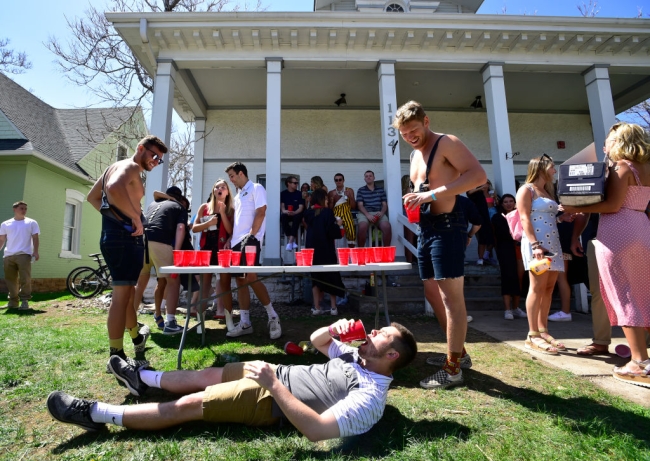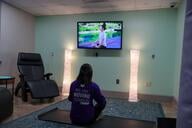You have /5 articles left.
Sign up for a free account or log in.

Students partied at the University of Colorado at Boulder in early May despite the county's stay-at-home order in effect at the time.
MediaNewsGroup/Boulder Daily Camera via Getty Images
Kira Griffith, a senior at the University of North Carolina at Chapel Hill and president of the Residence Hall Association, was “disappointed” last week when the campus called off its plan for in-person instruction due to outbreaks of coronavirus among students.
While she was disappointed in the students who knowingly violated the university’s "Carolina Together" social distancing guidelines, Griffith was equally disappointed with university leaders, including the UNC system’s Board of Governors, which “put students in this situation” in the first place, she said.
The reopening plans for the Chapel Hill campus's in-person semester included fully occupied residence halls and unclear consequences for noncompliance with social distancing and other guidelines, Griffith said.
It left "a lot of room to make a mistake," she noted. “The blame shouldn’t just fall on students.”
College leaders at institutions that already opened their campuses for the fall semester have in fact been placing much of the responsibility and blame for spreading the virus on students. The administrators have done this despite prior warnings about reopening from adolescence and behavioral experts that 18- to 22-year-olds were the least likely age group to follow directions for preventing the spread of COVID-19.
Colleges are urging students to wear masks, socially distance and avoid large gatherings on the one hand, but on the other hand are welcoming students back to campuses where some students want to meet new people and party, and others might share alcohol and drugs and hook up. They are encouraged by college officials to engage with one another and enjoy college life but to also be mindful of social distancing directives. Some students may find these mixed messages confusing and contradictory.
In some parts of the country, students see local bars open and packed with drinkers and wonder why their colleges' codes of conduct and community public health standards strictly limit the number of friends with whom they can gather.
Julia Marcus, an infectious disease epidemiologist and professor in the Department of Population Medicine at Harvard Medical School, said this “lack of consistency” in COVID-19 policies does not inspire compliance among students.
“Enjoy college,” a welcome week packet from the Georgia Institute of Technology, aimed at first-year students, proclaims. “Make the most of it, allow for yourself to make mistakes, don’t get too caught up in the negatives.” The next page lists the best practices for preventing coronavirus spread but does not mention social distancing.
Marcus said colleges need to set clear expectations for what the “college experience” will look like during the fall semester.
“There’s no way colleges could function right now if students were living their typical college experience,” she said. “Students can’t come in expecting this to look like what it typically would, but at the same time, administrators can’t expect students to act in a way that’s completely against their nature.”
Kent Syverud, chancellor and president of Syracuse University, told students, faculty members and staff in a “welcome back” message on Aug. 17 that “there is nothing better than seeing our community back on campus together, engaging with each other and living the Orange experience.” Three days later, J. Michael Haynie, vice chancellor for strategic initiatives and innovation at the university, scolded a group of first-year students for gathering in a large crowd on the university’s quad and putting the university’s semester plan for a residential college experience in jeopardy. In a message to students, Haynie called the behavior “reckless” and “selfish.”
“I want you to understand right now and very clearly that we have one shot to make this happen,” Haynie said in the message. “The world is watching, and they expect you to fail. Prove them wrong. Be better. Be adults. Think of someone other than yourself. And also, do not test the resolve of this university to take swift action to prioritize the health and well-being of our campus and Central New York community.”
Butch Charles, adviser to the Phi Beta Sigma fraternity chapter at Syracuse and parent of a doctoral candidate there, praised the university’s “hard-line” response to student misbehavior, though he said the urge to socialize is expected of first-year students during their first few days of college. The university’s Office of Fraternity and Sorority Affairs has been communicating with the chapters on campus throughout the summer about university guidelines for social activities and programming. Charles said he expects the fraternity members to follow the rules and not throw house parties.
“Me personally, not only as a community member but also as a parent who has a child on campus now, I want them to take any and all precautions and measures to keep students safe,” Charles said. “So if that means a few students need a wake-up call through suspension or worse if it comes to that, that’s fine … All it takes is one to be asymptomatic and pass it around, then we’re all shut down.”
But asking students -- especially those who are 17 or 18 years old -- to “be adults” neglects decades of research on how young people evaluate risks and rewards. Kenneth Elmore, associate provost and dean of students at Boston University, called such messages “incredibly condescending and not motivating” for students to follow the rules.
“Right now we need messages that are going to rally people together,” Elmore said. “Not condescend [to] them or yell at them, but to work together with them. Recognize that we make mistakes. Collectively, we’ve been trying to hold it together for a long time, and we’ve got to continue to do that.”
Laurence Steinberg, a professor of psychology at Temple University and a leading expert on adolescent behavior, said young adults tend to think more of “immediate rewards rather than long-term consequences,” and they have a unique need to socialize with others. Even if college-aged people understand the risks and consequences for breaking COVID-19 rules, they also tend to believe they won’t get caught, Steinberg said. Strong punitive approaches to bad behavior, such as those employed by Syracuse, Vanderbilt University, Purdue University and others last week, are “futile” and “not likely to work,” he said.
“When you have a temptation that is very immediately enticing, especially at this age, you often behave in a way that sets aside what you know you should be doing,” Steinberg said.
“This is the image that haunts me: a freshman is sitting alone in his room with a soggy sandwich that he got from the dining hall. Another student knocks on his door and says, ‘Haven’t you had enough of this? Let’s go and party.’ Especially for kids that are already dealing with the vulnerability of being at college, maybe for the first time, desperate for social contact, it seems like something that could be hard to resist.”
Marcus, the Harvard epidemiologist, has researched HIV prevention and promotion of sexual health. She said punitive public health efforts “don’t deter high-risk behavior -- they tend to drive that behavior behind closed doors.” A better approach would be for colleges to focus on the activities that students are permitted to engage in, she said. Institutions should be emphasizing lower-risk alternatives, such as virtual or outdoor events led by student activities staff and where students can be monitored for mask wearing and distancing. Colleges could also focus deterrence efforts on the most risky types of gatherings -- packed indoor parties -- and allow some flexibility for outdoor gatherings, Marcus said.
“We take a step back and ask, why do students have parties, and offer safer alternatives to those higher-risk settings,” she said. “It’s not zero risk for students to be playing beer pong outside, but we’d rather them be outside than in a fraternity basement.”
Elmore, the Boston University provost, is confident that an “honest” and “provocative” student-led public health campaign at BU, called F*ck It Won’t Cut It, will be effective in convincing students to practice safe coronavirus habits. Instead of simply telling students what they can’t do because of COVID-19, the campaign focuses on best practices for student behavior such as drinking, sex, dating and smoking marijuana, said Hailey McKee, a second-year graduate student and public relations manager for the campaign.
The campaign circulates information from the university’s student health services and Sexual Assault Response and Prevention Center, McKee said. It tells students that they’re permitted to have small gatherings with friends, but not to share drinks, and to social distance and use hand sanitizer. “Phone sex is in,” keep “consistent hook up buddies” and “discuss COVID-19 risks” with partners before having sex, the campaign’s website said. While coronavirus public health guidelines might imply sex with inconsistent or symptomatic partners is a bad idea, McKee said the campaign confronts the topic head-on.
The students use a common phrase used by Gen Z students -- “fuck it” -- which typically conveys an attitude of disregard for responsibilities and is used to “rationalize decisions that might not be best for us,” said Lindsay Rosenblatt, a senior and copywriter for the campaign. This generation of students, many of whom feel “invincible” to COVID-19, also tend to distrust institutions and authority, which is why the campaign believes such messaging will be more persuasive coming from peers, Rosenblatt said.
Students at Beloit College, a small liberal arts college in Wisconsin, are taking a similar, student-led approach to risky behavior this fall. Saad Ahsan, a senior and co-president of Beloit Student Government, said student and college leaders knew they couldn’t simply rely on documents to change typical student behavior. Ahsan and a group of leaders of student organizations on campus have been rethinking the college’s social scene and recommended providing tented outdoor spaces with lights where students could hold parties, he said.
Steinberg, the adolescence expert, said encouraging students to ask their sex partners whether they've experienced any common COVID-19 symptoms or ask for proof of a recent negative test is “a reasonable approach,” but he is more concerned about big parties where students will come into close contact with others they don’t know. Elmore said he’s “got my fingers crossed” that Boston University’s positive campaign will be effective in preventing such situations.
“I may be naïve, but I’ve been at it for a long time,” he said. “I know what motivates young people, and they don’t need a bunch of old people wagging their fingers at them. They don’t tend to listen to that.”
Boston University’s effort will be backed up by the university’s testing regimen, which involves testing undergraduate students upon their arrival to campus and then twice each week throughout the semester, according to the university’s website. Twice-a-week testing is considered by experts to be one of the better approaches for colleges and universities. Marcus said testing and contact tracing will be key to preventing “superspreader events,” and it’s not just about student behavior deterrence.
“The priority is to avoid crowded indoor parties, but avoiding those alone is not going to stop spreading, especially if those surveillance programs aren’t in place,” she said.
Griffith, the senior at UNC Chapel Hill, was discouraged about the coronavirus outbreaks on her campus last week and wondered whether if it might be better for other campuses to remain closed. She said colleges can do everything right to prevent students from breaking the rules, but it only takes a few people to get infected for the whole population to be exposed to the virus.
“Even with the enforcement strategy, that may not even be enough,” Griffith said. “Maybe it’s best for people to stay home.”








